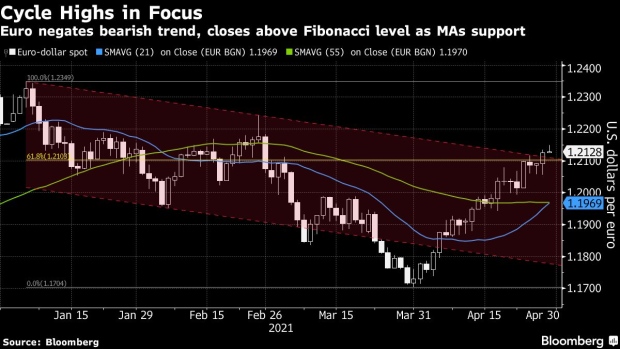May 2, 2021
Fed’s Dovish Tilt to Unleash Tide of Bets on Resurgent Euro
, Bloomberg News

(Bloomberg) -- Euro bulls are out in force this week, after Jerome Powell poured cold water on bets the Fed was poised to withdraw its aggressive support for the U.S. economy.
Creeping U.S. inflation won’t last and doesn’t justify higher interest rates, he said. That’s narrowed the gap between what investors can expect to earn in the U.S. over Europe, dashing the chances of a resurgent dollar and vindicating FX strategists who said the euro’s April rally has further to run.
“It is clear that Fed monetary withdrawal is off the agenda anytime soon, capping the upside on U.S. yields and helping euro-dollar bulls,” said Bloomberg Intelligence’s chief G-10 FX strategist Audrey Childe-Freeman.
It marks a big shift in sentiment for the euro, which started the year as a laggard compared to the British pound and the greenback as the continent struggled with vaccine shortages and stubbornly high Covid infections.
Now, the euro zone’s vaccination program is accelerating and investment strategists have been revising their expectations for European growth upward.
Europe’s catch up is showing up in the rates market and the gap between 10-year U.S. yields and their German counterparts is close to its narrowest since early March at 185 basis points.
In this environment, predictions of a euro advance against the dollar through to the year-end are becoming plentiful, even after the common currency gained more than 2% in April.
Euro Rebound
Commerzbank AG strategists expect the euro to rebound to $1.23 by the end of the year, from around $1.20 currently. Bloomberg Intelligence is even more bullish, forecasting the euro will hit $1.25 into the summer on account of Europe’s vaccine catch-up and rising economic optimism. Citigroup Inc. goes higher still, looking for the single currency to reach between $1.25 and $1.275 by the end of the third quarter.
Read More: The Europe Capitulation Trade Is in Full Swing on Vaccine Bets
“European vaccination dynamics continue to close the gap with the U.S. and the U.K.,” said Adam Pickett, a foreign-exchange strategist at Citigroup. “We expect the Fed will remain on the dovish side. This should open the door to further euro-dollar upside.”
Leveraged funds reduced net-short positions on the euro to the lowest since early March, according to data from the Commodity Futures Trading Commission for the week through April 27.
One-month risk reversals, a measure of sentiment, signaled traders in April were the most optimistic on the euro versus the dollar since late February.
There’s even a shift in the mood music around the potential for a more hawkish European Central Bank, even though its President Christine Lagarde has said any discussion of phasing out the pandemic emergency purchase program is premature.
Technical factors are also moving in favor of the euro. Last week, the currency closed above the Fibonacci level -- a psychologically important threshold -- for the first time since January, potentially signaling further gains.
Potential Taper
Some analysts and investors are sticking to the view that bets on a strengthening euro rally may be overblown, however. In spite of the increasingly upbeat mood in Europe, inflation and growth remain chronically lower in the euro-area than in the U.S.
The Fed may still start signaling plans to taper its bond buying program before the year is out. One policy maker, Dallas Federal Reserve President Robert Kaplan, broke ranks with Powell on Friday and said it may now be time to start debating a reduction in asset purchases.
Read More: Fed’s Kaplan Wants to Talk Tapering, Breaking Ranks With Powell
Meanwhile, Rick Rieder, chief investment officer of global fixed income at BlackRock Inc. said last week that U.S. growth is now strong enough to allow the Fed to step back from some of the extraordinary support it rolled out during the pandemic.
Rabobank’s head of FX strategy Jane Foley sees the euro moving lower to 1.18 in the next three to six months, with core inflation higher in the U.S. compared to the eurozone in the coming few years.
“Potentially this phase sees euro-dollar back towards the highs,” said James Athey, a money manager at Aberdeen Standard Investments, who has a small short on the euro. “But it’s all very dependent first and foremost on what U.S. yields are doing and of course it is a dollar move first and foremost.”
Week Ahead
Germany, France, Spain and Austria will sell a total of about 23 billion euros of bonds next week, according to Commerzbank AG.
There are no redemptions until May 25, when France is due to pay around 20 billion euros, while the next coupon payments are scheduled from Germany, Italy and Ireland on May 15.
The U.K. will sell up to 4.75 billion pounds of 10- and 15-year bonds next week, and the BOE will buy back debt across three operations. BOE policy meeting outcome is the main focus.
- Data for the coming week is mostly relegated to backward-looking figures and final PMI numbers
- Italy and Spain release preliminary manufacturing PMI figures on Monday and preliminary services PMI numbers on Wednesday
- ECB policy maker speeches are a constant next week starting with Francois Villeroy on Monday and ending with President Christine Lagarde who speaks at a State of the Union event on Friday. Chief economist Philip Lane and Isabel Schnabel speak on the days in between
- BOE Governor Andrew Bailey speaks at the press conference following the policy decision on Thursday
©2021 Bloomberg L.P.


